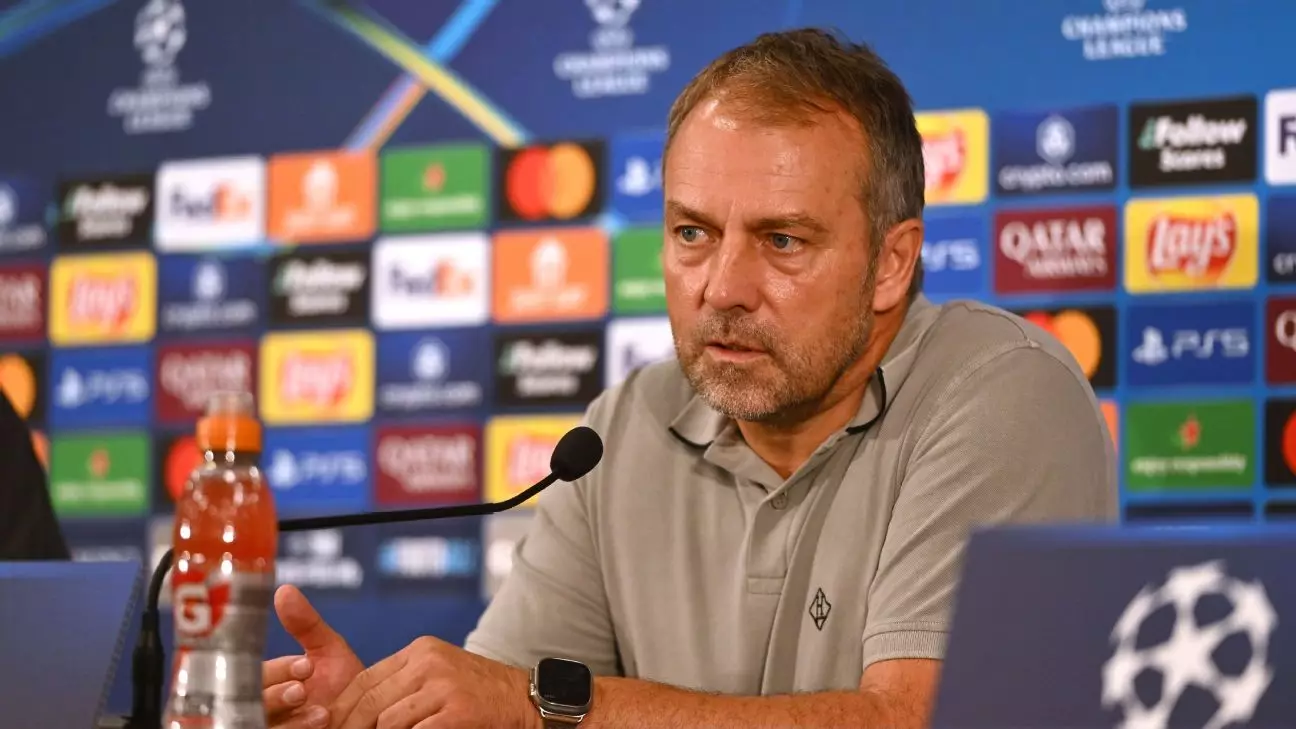Barcelona coach Hansi Flick finds himself navigating a tumultuous landscape as he juggles the demands of a crowded match schedule with a host of player injuries. Despite the mounting challenges, Flick has asserted that excuses will not be part of his vocabulary this season. With LaLiga fixtures followed closely by the Champions League, managing player fitness while maintaining competitive performance is a daunting task for any coach, particularly one leading a team with a thinning roster.
Flick’s resolve comes as Barcelona contends with disappointment; after a flawless start to the season in LaLiga, the team recently suffered its first defeat against Monaco, raising many eyebrows across the football world. The looming question is whether the team can sustain its initial momentum amid the increased match frequency and injury concerns. Flick’s positive attitude suggests he believes in the resilience and determination of his squad, reinforcing a philosophy that underlines focusing on who is available rather than lamenting those who are not.
The ongoing discourse around player welfare in football has never been more pertinent, as evidenced by Flick’s commentary on the injuries plaguing his squad. Notable players such as Ronald Araújo, Andreas Christensen, and Gavi are sidelined, raising alarm about the fragility of squad depth. Flick’s insistence on taking responsibility for managing the remaining players, rather than dwelling on those missing, reflects a forward-thinking mentality. This approach is critical in a sport where depth can often spell the difference between success and failure.
The coach’s call for UEFA and FIFA to reevaluate the relentless scheduling comes at a critical juncture. As players like Manchester City’s Rodri express concerns regarding striking actions due to match overloads, the discussion intensifies. In club football, every match counts towards glory, yet the cumulative effect of back-to-back games can wear down even the most seasoned athletes. Flick’s recognition that fresh legs lead to better performances points to an astute understanding of modern football’s physical demands, and his commitment to rotation is a tactic to preserve both player health and competitive edge.
Barcelona’s next test lies in facing Villarreal, a team renowned for its solid start to the league with no losses so far. The buildup to this match will highlight not just tactics but also the psychological resilience of Flick’s squad. Flick has emphasized confidence as a key component of success, suggesting that the manner in which players believe in their capabilities could dramatically affect their on-pitch performance.
With some critical players unavailable due to suspension and injury, the Barcelona squad must demonstrate unity and adaptability. Flick’s remarks about their preparation indicate confidence that even with a depleted team, they can execute their game plan effectively. The historical struggles against strong opponents like Villarreal only add an extra layer of difficulty, but also a chance for the remaining players to step up when their contributions are most needed.
The importance of strong, decisive leadership cannot be overstated in football management. Flick’s defense of goalkeeper Marc-André ter Stegen following recent criticism highlights his commitment to his players and their mental well-being. Mistakes, such as Ter Stegen’s in the recent Monaco match, are a part of the game; how a manager approaches these moments significantly influences team morale.
A cohesive team culture thrives on support and understanding, especially when facing adversity. Flick appears to be fostering an environment where players feel empowered to take risks and express themselves on the field, collectively learning from missteps. By focusing on building a positive atmosphere, he is nurturing resilience within his squad, preparing them for both ongoing challenges and future successes.
In the whirlwind of pressures from match schedules and an injury-hit squad, Hansi Flick remains unwavering in his approach. His philosophy of rejecting excuses and fostering a culture of growth speaks to a broader narrative in football: the delicate balance between performance and well-being. The coming weeks will be crucial in assessing whether Flick’s strategies bear fruit as Barcelona confronts formidable opposition while striving for excellence amidst challenges.
As the beautiful game continues to evolve, addressing the concerns surrounding player welfare alongside competitive integrity will remain at the forefront. Flick’s determination to adapt and strategize will be tested, yet the essence of football—resilience, teamwork, and passion—will guide Barcelona through this demanding season.

